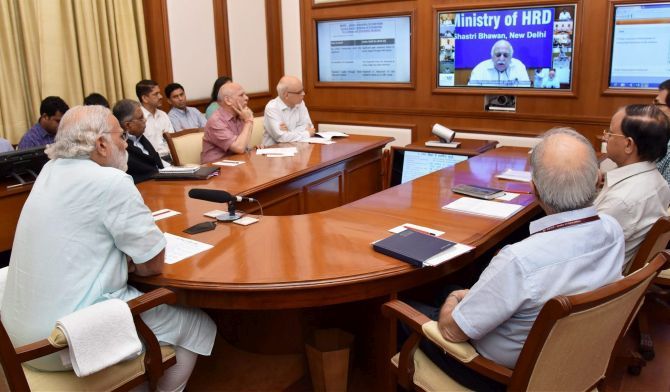The prime minister seems to have turned his face away from the business of introducing serious reform, says T N Ninan.

Things have never looked better for the ruling combine. The primary political opposition has been scattered, leaving no credible challenger on the national stage. The economy has never been better since 2011 or so, with a recovery clearly on the cards. It may be a weak recovery, but the combination of improved corporate results (if we set aside the banks, that is) and the prospect of a good monsoon have sent the stock market soaring -- though still not to the levels that prevailed a year ago.
If the government wanted to seize the moment and push for the changes that would deliver faster growth, now would be a better time than any. The economy can bear the shocks of change, and there is enough political space for the government to take calculated risks. That is why it is so disappointing to read the comments by the prime minister -- who seems to have turned his face away from the business of introducing serious reform.
Mr Modi says no further attempt will be made to change the national land acquisition law. Why not? If the government thinks it can muster a two-thirds majority in the Rajya Sabha (required to push through the constitutional change that will permit a goods and services tax), it should be able without much effort to get the simple majority that is required for passing a new Bill on land.
On the labour law front, the prime minister is looking at the wrong issue. He argues that any changes should not be just for businessmen, they should also be pro-labourer. This misses the point made repeatedly over the years, that flexibility in the labour market is required in order to create new opportunities for work in the organised sector, especially in labour-intensive sectors like garments. The law on industrial labour should be pro-employment; whether it is pro-business or pro-labour is beside the point.
On State-owned companies too, Mr Modi has signalled that there will be no real change. One must ask why, when so many government companies have no financial, economic or other rationale. The example that stares everyone in the face is Air India, which if it were in the private sector would long ago have met the fate of Kingfisher Airlines. Ditto with the government-owned hotel chain. It is distressing to get such status quo views from a prime minister who is in the rare position of being able to lead change, but who argues instead that the experts have failed to tell him what ‘big bang’ reforms he should introduce.
The most radical reform of all has to be in the banking sector, where problems long hidden have come to the surface, causing the majority of government bank shares to lose half their value over the last two years. The banks’ financial results have pulled down overall corporate results for the latest quarter, and their capital constraints now act as a constraint on the economy -- while overall credit growth is slow enough at about 10 per cent, corporate credit is said to be growing at barely five per cent, which if true would be the lowest in living memory.
If the banks are not fixed, the economy will find it difficult to perform to its limit. But nothing that the government has tried so far has made much of a difference to the way banks function. While it remains to be seen what ideas will emerge from the new bank board, the finance minister would have done well to say that it cannot be business as usual. Unfortunately, that signal is not forthcoming from his current round of interviews.
It has been said that India will do the right thing only after it has tried all the alternatives -- and only when a crisis pushes the country to the realisation that there are no options.
With the government expecting good times to return, the signals coming through are of a new complacency. In which case…Oh, for a crisis!
Image: Prime Minister Narendra Modi chairing the 12th interaction through PRAGATI -- an ICT-based platform for Pro-Active Governance & Timely Implementation -- to review projects related to the ministry of HRD, in New Delhi on May 25, 2016. Photograph: PTI Photo.










